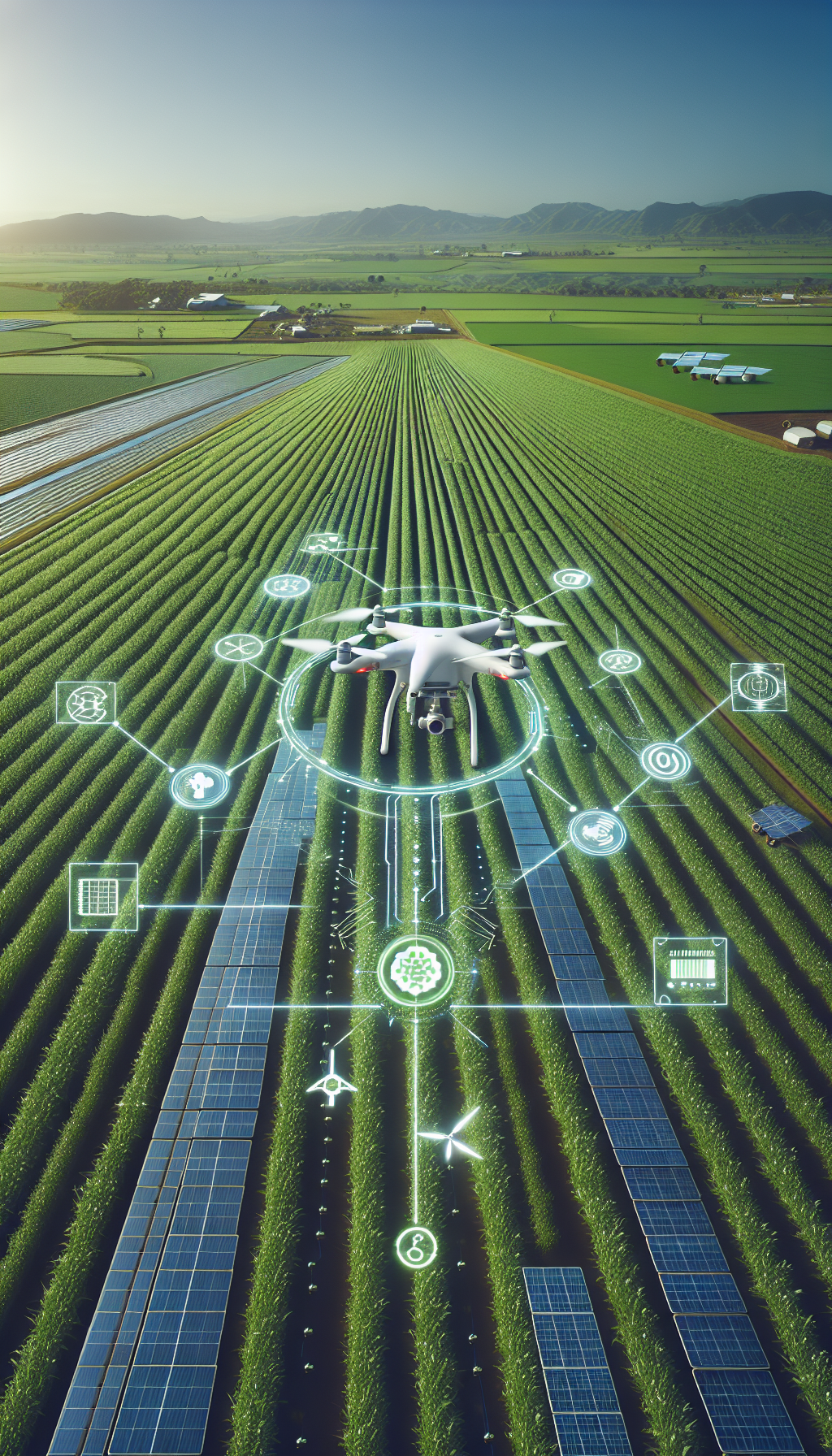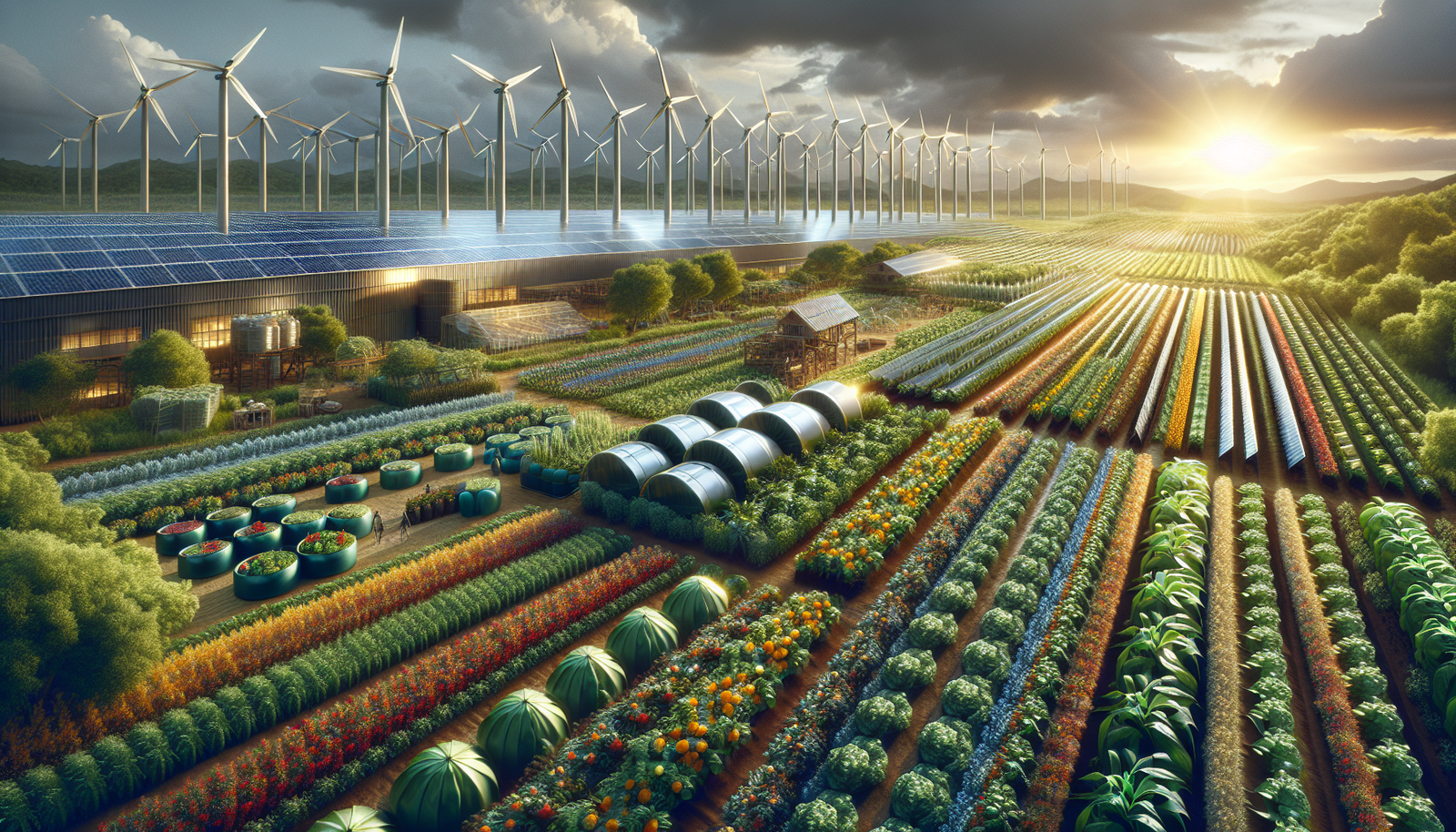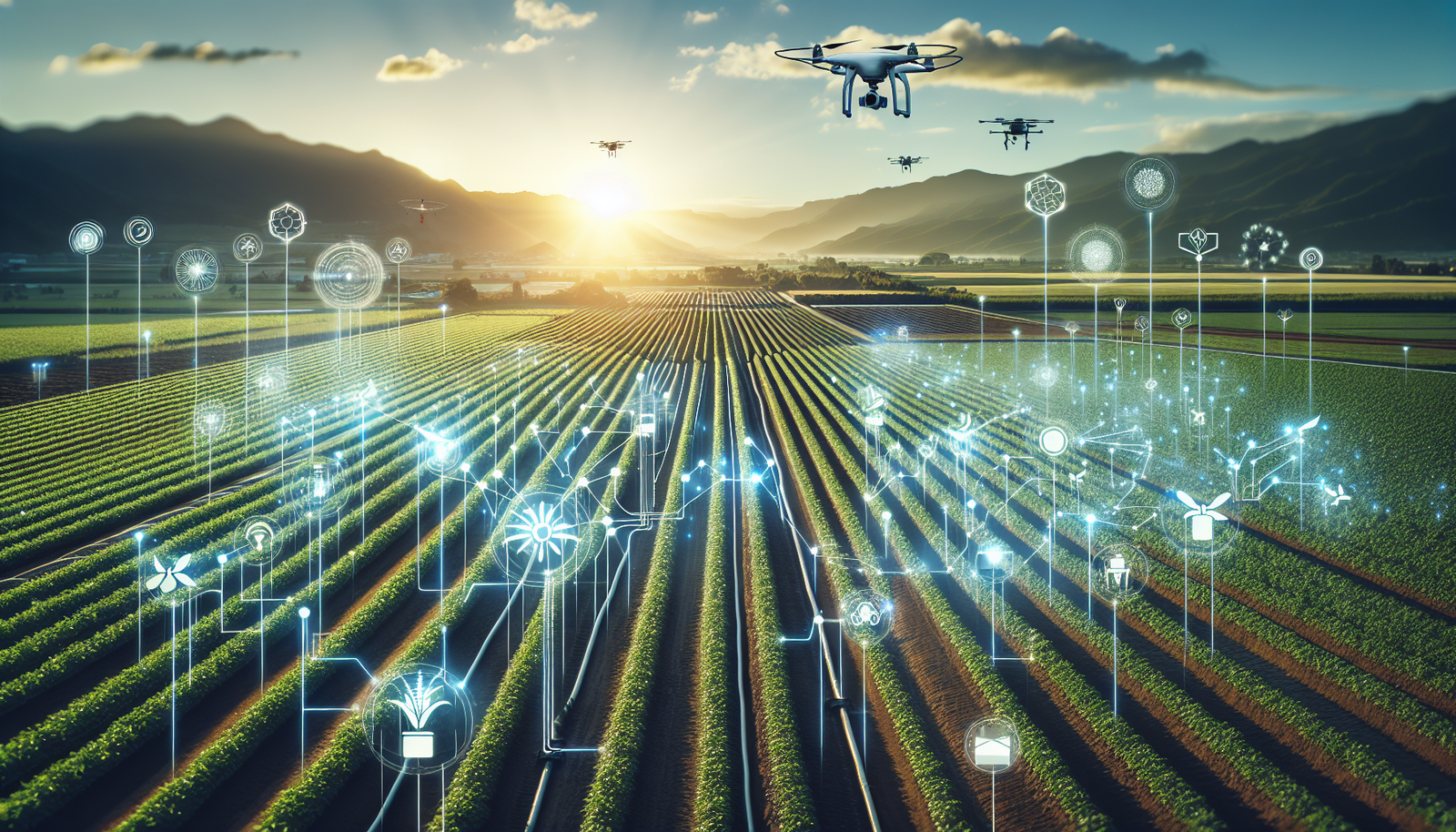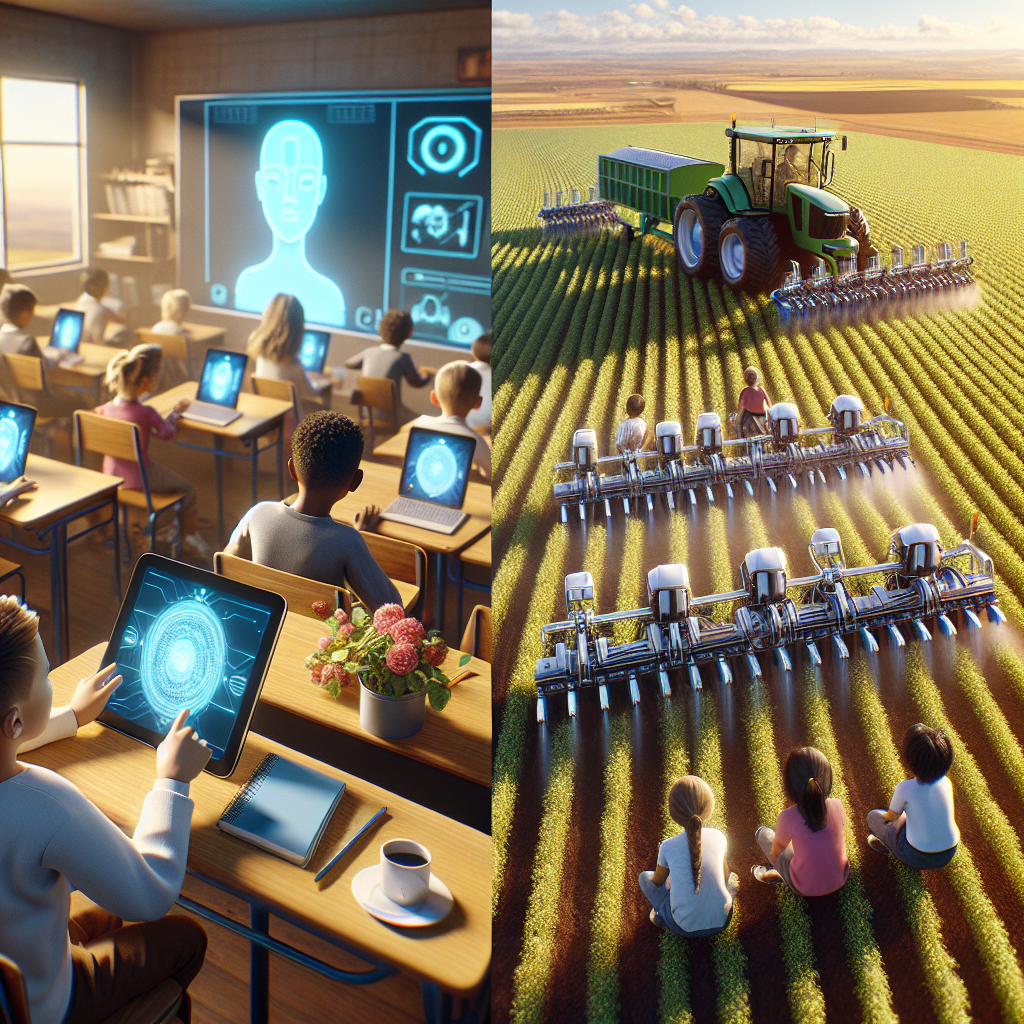The Intersection of AI and Agriculture
The integration of Artificial Intelligence (AI) into agriculture marks a significant turning point in the quest for sustainable food systems. AI technologies offer innovative solutions to age-old agricultural challenges, fundamentally altering traditional farming practices. One of the primary ways AI contributes is through precision farming, which utilizes data-driven insights to optimize field-level management regarding crop farming. This approach helps in maximizing yield, minimizing resource use, and reducing environmental impact. By employing AI algorithms, farmers can analyze data from various sources, such as satellite imagery, weather patterns, and soil sensors, to make informed decisions about planting, irrigation, and harvesting.
Moreover, AI plays a crucial role in optimizing agricultural supply chains. AI systems can predict demand with high accuracy, allowing for better planning and distribution of food products, thus reducing waste. For instance, machine learning models can analyze consumer purchasing patterns and provide forecasts that help retailers stock the right amount of produce. This not only reduces the chances of overproduction but also ensures that consumers receive fresher products. Additionally, AI can enhance logistics by optimizing routes for transportation, which can lead to reduced fuel consumption and lower carbon emissions.
AI’s capabilities also extend to improving crop resilience, which is increasingly important in the face of climate change. By analyzing genetic data, AI can assist in the development of crop varieties that are more resistant to pests, diseases, and adverse weather conditions. This is achieved through AI-driven simulations and models that predict how different plant breeds will perform in various environments. Furthermore, AI can monitor crop health in real-time, identifying signs of stress or disease before they become severe. This proactive approach enables timely interventions, safeguarding yields and ensuring food security.
However, the intersection of AI and agriculture is not without ethical considerations. There is a growing need to address issues such as data privacy, the digital divide, and the potential displacement of labor. Ensuring that AI technologies are accessible to smallholder farmers in developing regions is crucial for equitable growth. Additionally, transparent data practices must be established to protect farmers’ information and foster trust in AI systems. Balancing technological advancement with ethical responsibility is essential for the sustainable transformation of agricultural systems.
AI-Driven Precision Farming
Precision farming is at the forefront of modern agricultural practices, and AI is playing a pivotal role in its advancement. By harnessing the power of machine learning algorithms and data analytics, farmers can make more informed decisions that lead to increased efficiency and sustainability. AI technologies are being used to analyze vast amounts of data collected from sensors, drones, and satellite imagery. This data helps in understanding weather patterns, soil conditions, and crop health, enabling farmers to apply the right amount of water, fertilizers, and pesticides precisely where and when they are needed.
The adoption of AI in precision farming is not just about optimizing inputs; it’s also about maximizing outputs. According to a recent study, the use of AI-driven precision farming techniques can increase crop yields by up to 30% while reducing the use of water and fertilizers by 10-20%. These improvements are crucial in meeting the demands of a growing global population while minimizing environmental impact.
| Benefits of AI in Precision Farming | Percentage Improvement |
|---|---|
| Increased Crop Yields | 30% |
| Reduced Water Usage | 10% |
| Decreased Fertilizer Use | 20% |
Moreover, AI-driven systems are capable of predicting pest infestations and disease outbreaks, allowing for timely interventions that can save entire harvests. This predictive capability is a game-changer for farmers who can now rely on AI to alert them about potential threats and suggest optimal solutions. As AI continues to evolve, its applications in precision farming will become more sophisticated, further driving the sustainability of food systems worldwide.
Optimizing Supply Chains with AI
Artificial Intelligence (AI) plays a pivotal role in optimizing supply chains by enhancing efficiency and transparency. As supply chains in the food industry become increasingly complex, AI technologies such as machine learning and predictive analytics are instrumental in streamlining operations. These technologies help in forecasting demand more accurately, thus minimizing overproduction and underproduction, which are common causes of waste in food systems. AI-driven platforms can analyze vast datasets to predict consumer behavior patterns, allowing companies to adjust their production schedules and inventory levels accordingly.
In addition to demand forecasting, AI is utilized to improve logistics and transportation within supply chains. By analyzing traffic patterns, weather conditions, and vehicle performance, AI systems can optimize delivery routes, reducing fuel consumption and ensuring timely delivery of perishable goods. This not only reduces the carbon footprint but also maintains the quality and safety of food products. Moreover, AI can facilitate better communication and coordination among different stakeholders in the supply chain, from farmers to retailers, ensuring a smooth flow of information and goods.
Another key application of AI in supply chains is in monitoring and maintaining food quality. With the use of AI-powered sensors and IoT devices, companies can track the condition of food items throughout the supply chain. This technology helps in identifying any deviations from optimal storage conditions, enabling timely interventions to prevent spoilage. As a result, AI contributes significantly to reducing food waste, a critical component of sustainable food systems.
Finally, AI aids in ethical sourcing and sustainability tracking within supply chains. By providing detailed insights into the origins and journey of food products, AI helps companies ensure compliance with sustainability standards and ethical practices. This transparency allows consumers to make informed choices, fostering a more sustainable and responsible food system. The integration of AI in supply chains not only enhances operational efficiency but also aligns with the broader goals of sustainability and ethical responsibility.
Reducing Food Waste Through AI
Artificial Intelligence (AI) is playing a pivotal role in reducing food waste, a crucial component in the journey towards sustainable food systems. By leveraging AI technologies, businesses and consumers are able to identify inefficiencies and implement solutions that minimize waste. One of the primary ways AI aids in reducing food waste is through advanced data analysis and forecasting. AI algorithms can analyze historical data to predict demand more accurately, ensuring that production and supply align closely with consumer needs, thereby reducing surplus and spoilage.
AI-driven platforms are also enhancing food inventory management. These platforms utilize machine learning to monitor stock levels in real-time, automatically reorder items when necessary, and suggest optimal storage conditions to prolong shelf life. This precision in inventory management not only helps retailers and suppliers reduce waste but also saves costs associated with overstocking or food spoilage. Additionally, AI tools can assess the quality of perishable goods using image recognition technology, identifying items that need to be prioritized for consumption or sale, further reducing the likelihood of waste.
In the consumer sector, AI applications are empowering individuals to make informed decisions about food usage and waste reduction. For example, smart kitchen appliances equipped with AI can suggest recipes based on the ingredients available, ensuring that perishable items are used before they spoil. Moreover, mobile applications that track food purchases and expiration dates alert consumers to use items before they expire, thereby minimizing household food waste. Such innovations are critical as household food waste accounts for a significant portion of overall food loss globally.
The impact of AI on reducing food waste is not only beneficial for economic efficiency but also for environmental sustainability. By cutting down food waste, we reduce the carbon footprint associated with food production and disposal. The integration of AI in this domain exemplifies the potential of technology to drive significant positive change, aligning with global sustainability goals. As AI continues to evolve, its capability to address food waste challenges will undoubtedly expand, offering new opportunities for more sustainable food systems.
AI in Sustainable Aquaculture
The integration of artificial intelligence in aquaculture is significantly transforming the industry, offering solutions for more sustainable practices. AI technologies are enhancing the efficiency and productivity of fish farming by enabling more precise monitoring and management of aquatic environments. By utilizing AI-driven tools, farmers can collect and analyze data on water quality, fish health, and feeding patterns, leading to more informed decision-making processes.
One of the primary applications of AI in aquaculture is the optimization of feeding strategies. Traditional feeding methods often lead to overfeeding, which contributes to water pollution and increases production costs. AI systems, however, utilize machine learning algorithms to determine the optimal amount of feed required, based on real-time data analysis. This not only reduces waste but also promotes healthier fish growth. Furthermore, AI technologies can monitor fish behavior and health, identifying signs of disease or stress early, thus minimizing the reliance on antibiotics and other medications.
AI also plays a crucial role in enhancing sustainability by improving supply chain management in aquaculture. Through the use of predictive analytics, AI can forecast demand and optimize logistics, ensuring that fish are harvested and delivered at the right time, reducing spoilage and waste. Additionally, AI-driven systems facilitate better resource management, promoting the efficient use of water and other inputs. This is particularly important in addressing the growing concerns over the environmental impact of aquaculture practices.
Moreover, AI contributes to the development of more resilient aquaculture systems by enabling the cultivation of species that are more resistant to climate change and disease. Through genetic analysis and selective breeding programs powered by AI, it’s possible to enhance the resilience of fish stocks. This capability is vital in maintaining production levels in the face of environmental shifts. In summary, the application of AI in sustainable aquaculture holds the promise of revolutionizing the industry by improving efficiency, reducing environmental impacts, and ensuring food security for the future.
Enhancing Crop Resilience with AI
Artificial Intelligence (AI) is playing an increasingly pivotal role in enhancing crop resilience, a crucial factor in ensuring food security amidst changing climatic conditions. By integrating AI-driven predictive analytics and machine learning models, farmers are better equipped to anticipate and respond to environmental stressors such as drought, pests, and diseases. These technologies enable the development of climate-smart agriculture practices that optimize resource use and minimize risk, ultimately leading to more resilient crops.
AI systems can analyze vast amounts of data collected from various sources, including satellite imagery, weather patterns, and soil sensors. This data is utilized to create detailed models that predict how crops will react to different stressors. For instance, AI can forecast drought impacts and suggest optimal irrigation schedules. An example of this technology in action is IBM’s Watson Decision Platform for Agriculture, which provides farmers with actionable insights to make informed decisions regarding crop management.
| AI Technology | Application | Impact on Crop Resilience |
|---|---|---|
| Predictive Analytics | Weather forecasting and risk assessment | Improves preparedness against climate variability |
| Machine Learning Models | Pest and disease detection | Enables early intervention to prevent crop loss |
| Satellite Imagery Analysis | Monitoring crop health | Allows for precise targeting of interventions |
Furthermore, AI contributes to breeding more resilient crop varieties by analyzing genetic data to identify traits associated with resilience. This accelerates the development of genetically superior crops that can withstand extreme weather conditions and resist pests and diseases. As AI technology continues to evolve, its integration into sustainable agriculture practices will be vital in addressing the challenges posed by climate change and ensuring a stable food supply.
AI for Climate-Smart Agriculture
Artificial Intelligence (AI) is increasingly playing a vital role in the development of climate-smart agriculture, which aims to sustainably increase agricultural productivity and incomes, adapt and build resilience to climate change, and reduce greenhouse gas emissions. By leveraging AI technologies, farmers can make more informed decisions that optimize resource use and mitigate environmental impacts. One of the primary ways AI contributes to climate-smart agriculture is through precision farming, where AI-powered tools analyze data from various sources to provide actionable insights.
Precision farming utilizes AI-driven analytics to monitor and predict weather patterns, soil conditions, and crop health, ensuring that water, fertilizers, and pesticides are used efficiently. For example, AI algorithms can process satellite imagery to identify areas of a field that require more attention, such as irrigation or pest control. This targeted approach not only conserves resources but also reduces greenhouse gas emissions by minimizing the overuse of fertilizers. Additionally, AI systems can forecast weather changes, allowing farmers to prepare for adverse conditions and adjust their practices accordingly.
Another significant application of AI in climate-smart agriculture is optimizing supply chains. By using AI to analyze data from production to distribution, the entire supply chain can be streamlined to reduce waste and energy consumption. AI can predict demand more accurately, ensuring that only the necessary amount of food is produced and transported. This minimizes excess production and the associated emissions from storage and transportation. Furthermore, AI can enhance crop resilience by identifying and breeding crop varieties that are more resistant to climate change impacts such as droughts or floods.
Despite the numerous benefits, the integration of AI into climate-smart agriculture must consider ethical implications, such as data privacy and the digital divide. Smallholder farmers in developing regions, who are most vulnerable to climate change, may lack access to the necessary technology and infrastructure to benefit from AI advancements. Ensuring equitable access and addressing these ethical concerns is crucial for the successful implementation of AI in sustainable food systems. In summary, AI holds great promise for advancing climate-smart agriculture by enhancing productivity, reducing environmental impact, and building resilience to climate change.
AI-Powered Urban Farming
Urban farming has emerged as a vital component in the quest for sustainable food systems, and AI is playing a transformative role in enhancing its efficiency and effectiveness. By integrating AI technologies, urban farms can optimize resource allocation, monitor plant health, and automate labor-intensive tasks. AI-driven data analytics enable urban farmers to make informed decisions based on real-time data, thus maximizing yield while minimizing resource use. For instance, AI algorithms can predict the optimal amount of water and nutrients required for specific crops, reducing waste and conserving resources.
Moreover, AI-powered sensors and IoT devices facilitate precision agriculture in urban settings. These sensors continuously collect data on environmental conditions such as temperature, humidity, and light levels. This data is then analyzed to create precise growing conditions for various crops. As a result, urban farms can achieve consistent crop quality and increased productivity. A case study conducted in a vertical farm in New York demonstrated a 30% increase in lettuce yield by employing AI-based environmental controls. The table below illustrates the impact of AI on crop yield and resource efficiency:
| Crop Type | Yield Increase (%) | Water Savings (%) | Nutrient Use Reduction (%) |
|---|---|---|---|
| Lettuce | 30 | 25 | 20 |
| Tomatoes | 20 | 30 | 15 |
| Herbs | 25 | 20 | 10 |
In addition to enhancing productivity, AI supports urban farming by addressing challenges related to supply chain management. Urban farms can use AI to predict demand patterns, ensuring that produce is harvested and delivered at peak freshness while minimizing storage time. This not only reduces food waste but also enhances the overall sustainability of the food system. Furthermore, AI can assist in identifying the most efficient distribution routes, thus lowering the carbon footprint associated with food transportation in urban areas. In summary, AI-powered urban farming represents a significant advancement in creating resilient and sustainable food systems within densely populated areas.
Ethical Considerations in AI-Driven Food Systems
The integration of AI into sustainable food systems brings about significant ethical considerations that must be addressed to ensure equitable and fair outcomes. Data privacy and security are major concerns as AI relies on extensive data collection, including sensitive information from farmers and consumers. Ensuring that this data is managed responsibly and securely is crucial to prevent misuse and protect individuals’ privacy rights. Additionally, the deployment of AI technologies may lead to job displacement in traditional farming roles, raising ethical questions about the social impact on rural communities and the need for retraining programs.
Another ethical consideration is the potential for bias in AI algorithms. If AI systems are trained on biased data, they may perpetuate or even exacerbate existing inequalities in food distribution and access. It is essential to develop AI models that are inclusive and representative of diverse agricultural practices and communities. Furthermore, there is a need for transparency and accountability in AI decision-making processes to ensure that stakeholders can trust the outcomes and understand how decisions are made.
| Ethical Issue | Implication |
|---|---|
| Data Privacy | Risk of misuse and breach of sensitive information |
| Job Displacement | Potential loss of traditional farming jobs |
| Algorithmic Bias | Possible reinforcement of existing inequalities |
| Lack of Transparency | Challenges in understanding AI-driven decisions |
The ethical deployment of AI in food systems also requires a consideration of environmental impacts. While AI can enhance crop resilience and reduce waste, the technology itself must be sustainable. This means evaluating the energy consumption and carbon footprint of AI systems to ensure that they do not inadvertently contribute to environmental harm. Policymakers and stakeholders should work collaboratively to establish guidelines and standards that promote ethical AI practices, balancing innovation with responsibility to create a sustainable food future.
AI and Food Security
Artificial Intelligence (AI) is playing a pivotal role in enhancing food security through its ability to analyze vast amounts of data and provide actionable insights. By integrating AI technologies into agricultural practices, farmers can make more informed decisions, leading to increased productivity and efficiency. One of the critical challenges in achieving food security is dealing with unpredictable variables such as climate change, pest infestations, and disease outbreaks. AI helps mitigate these risks by providing predictive analytics and real-time monitoring systems.
Precision agriculture is a key area where AI contributes significantly to food security. By utilizing AI-driven tools, farmers can optimize the use of resources such as water, fertilizers, and pesticides. This not only boosts crop yields but also ensures that farming practices are sustainable. For instance, AI algorithms can process satellite images and data from IoT sensors to monitor soil health and crop conditions, allowing for timely interventions. The result is a more resilient agricultural system that can withstand environmental challenges and secure food supply.
Moreover, AI enhances food security by improving crop resilience and adaptability. AI models can analyze genetic data to identify traits that make crops more resistant to pests, diseases, and extreme weather conditions. This information is crucial for developing new crop varieties that can thrive in changing climates. Additionally, AI facilitates the exchange of knowledge and best practices among farmers through digital platforms, enabling them to adopt innovative techniques and improve their yields.
In summary, the integration of AI in food security strategies offers a promising pathway to addressing global hunger and ensuring a stable food supply for future generations. By leveraging AI’s capabilities in data analysis, resource management, and predictive modeling, we can create more resilient and sustainable food systems. This transformation is essential for meeting the growing food demands of an expanding global population while preserving the planet’s resources.
Future Prospects of AI in Food Sustainability
The future of AI in sustainable food systems is both promising and multifaceted. As AI technologies continue to advance, their applications in agriculture and food production are expected to grow exponentially. One of the most significant prospects is the enhancement of precision farming techniques. By utilizing AI-driven data analysis, farmers can achieve unprecedented levels of accuracy in planting, watering, and harvesting crops. This not only maximizes yield but also minimizes resource use, promoting sustainability.
Moreover, AI is poised to revolutionize food supply chains by providing real-time monitoring and predictive analytics. This can lead to more efficient logistics, with AI systems predicting demand and optimizing delivery routes to reduce carbon emissions. The integration of AI in supply chains also helps in maintaining food quality and safety standards, ensuring that consumers receive fresh and healthy produce. As AI technology becomes more sophisticated, its ability to handle complex logistical challenges will likely improve, paving the way for a more efficient and sustainable global food network.
Another crucial area where AI can make a significant impact is in reducing food waste. By using machine learning algorithms to predict spoilage and optimize inventory management, food producers and retailers can significantly cut down on waste. This not only benefits the environment but also has economic advantages, as reducing waste translates to cost savings. In addition, AI can assist in developing resilient crop varieties by analyzing vast datasets to identify traits that enhance resistance to pests and climate change.
However, these advancements come with ethical considerations. The deployment of AI in food systems must be handled with care to ensure it does not exacerbate existing inequalities or lead to job displacement. It is essential to develop policies that encourage the equitable distribution of AI benefits and to invest in training programs that help the workforce adapt to technological changes. As we look to the future, the role of AI in promoting food sustainability will likely become increasingly important, offering solutions that are both innovative and conscientious.



